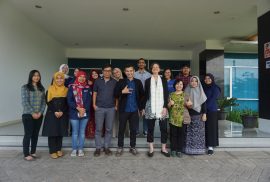Discussion Series I “ASEAN Community: Does Identity Matter?” with Drs. Muhadi Sugiono, M.A., a researcher at CESASS UGM and a lecturer at Department of International Relations UGM, at CESASS UGM (23/05/19).
Activity
Training of Journal Management and Communication Strategy Preparation for PUI PT with Syahrul Fauzi, S.Pt., M.Pd. (Publishing and Publication Agency – BPP UGM), Wuri Handayani, MA PhD. (Journal of Economy and Business UGM), Ika Krismantari (The Conversation), and Drs. Eduard Depari, MA., M.Sc. (Indonesian Television Academy) invites the Indonesian Center for Science and Technology (PUI-PT) Featured Center and Research and Technology at Tara Hotel Yogyakarta (05/17/19).
SEA Chat #15: Panel Discussion “Empowering Refugees in Southeast Asia” with Rahma Safira S. (Faculty of Law, Universitas Gadjah Mada) and “Negotiations between Youth and Job Market Flexibility: A Case Study of Micro-Celebrities in Yogyakarta” with Arif Budi D. (Dept. of Sociology, Universitas Gadjah Mada), at CESASS UGM Library (16/05/19).
SEA Chat #14 “Extrajudicial Killings of “War on Drugs” in the Philippines” with Laras Ningrum, an undergraduate student of Universitas Muhammadiyah Yogyakarta, at CESASS UGM Library (09/05/19). Thank you for your participation and see you at our next event!










